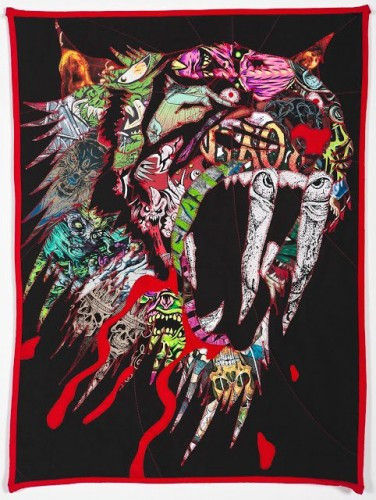quilts made of metal shirts by Ben Venom
(Here’s an opinion piece by Andy Synn.)
It seems like we often (and deservedly) praise bands for having a multitude of influences, for having a multi-faceted and varied sound, for achieving synthesis of diverse and disparate elements and using them to create a unique core identity for themselves. Heck, one of the key ways (although far from the only way) in which Metal progresses is by incorporating new sounds and influences, new styles, into the core genre, so it’s not surprising that we often laud those bands who bring something new, something fresh and exciting to the table.
After all, lack of breadth and variety in a band’s influences often does tend to lead to repetition and stagnation. If your band is happy to describe yourselves as “like Meshuggah” for example, then it’s odds-on that you’re probably just going to sound like a lesser-copy of the Swedish cybernauts. Just as if you’re a Thrash band and your only influences are other Thrash bands – and usually that means going back to the same tapped-out well as every other band – it becomes less and less likely that you’ll be pushing the genre forward, rather than simply rehashing or reworking what’s gone before (not, let me add, that there’s always anything intrinsically wrong with that).
Yet we also have to be careful about praising bands with too many influences wholesale. It’s certainly possible for bands to go overboard with their disparate influences and styles, and end up a directionless mish-mash of bits and pieces of other bands, which never really cohere into a greater whole.
But that’s not the only potential problem bands face when trying to weave together their influences and inspirations…
It seems to me that there’s a paradox that often (though by no means always) comes into play when bands try to incorporate too many influences into their sound. Even if they avoid the problems and pitfalls of trying to conglomerate a single, coherent identity out of their many different inspirations… there’s no guarantee that the end result will be any more unique as a result!
You’ll probably have seen it yourselves. Bands referring to themselves — or being referred to by blogs/reviewers/PR people — as “Technical-Melodic-Brutal-Symphonic-Progressive-Blackened-Death-Metal-Groove-Core”… as if stringing together sub-genre terms and modifiers conveys some sort of added legitimacy or attests to a measure of additional creativity.
(Heck, I even lightly poke fun at this trend by calling my own band “Omni-Dimensional Death Metal”… which I still stand by…)
However, what often happens, in a display of cruel irony, is that by trying to create a “unique” blend out of this excess of influences and styles, a majority of the bands attempting this all end up sounding exactly alike and utterly homogenous.
One reason this might happen – and this is conjecture on my part (though based on what I think is reasonably sound logic) – is that certain ingredients and influences only really fit together in certain ways. Elements A and B only really interlock effectively in a few ways… and elements B and C only interlock in a few ways… but some of those ways cross-over with how A and B come together… and the same thing with C and D, J and K, X and Y… etc. So when you’re putting together your “sound” from all these little modules, you start being restricted in just how you can put it all together.
The more elements you add, the more slots you fill, restricting the ways in which you can put the pieces together.
So, ironically, the more you add to your sound to make it “unique”, the more you end up falling prey to the same formulaic constraints as every other band trying to do the same thing.
Now, that’s not a universal thing. There are definitely bands out there who truly are unique and seem almost mystically capable of putting together any number of different ideas and influences in new and unpredictable ways.
But not every band is capable of that.
But that’s ok though, because not every band needs to be like that. Sometimes all you need is to be aware of what your real strengths are, in order to find your own unique identity. Rather than trying to distinguish yourself by virtue of how much you can jam into every song, maybe it’s worth just focussing on the songwriting itself, and allowing that to stand the test of time?
At some point you see, a lot of us were sold the lie that the only way to be unique was to label yourself as “Progressive”… and the only way to actually be “Progressive” was to simply roll around in a big pile of musical influences, and see what stuck.
And while that (somehow) works for certain bands, for the most part the artists who attempt this sort of cross-pollination end up as little more than jack of all trades, and master of none. It’s the Attention Deficit version of “Prog” – trying to be everything all at once, no matter how superficial it may be, and all you ultimately end up doing is swapping bits and pieces around, without ever adding anything new, or anything that’s really your own.
Similarly, the availability of outside influences can itself act as a crutch for real creativity. When you have what is essentially a widely available “get-out” clause ready and waiting, you’re less likely to push yourself to find new ways of doing things.
Instead – and this is something I see quite often – when you come to a “difficult” moment in your song-writing process, it’s easier just to jump to a new sound, to incorporate some other style in a superficially “progressive” manner, than it is to try and expand what you’re currently doing.
There’s something to be said for working within restrictions and constraints. Over the years a number of artists, from all different mediums, have stated unequivocally that purposefully limiting themselves, not allowing them the possibility of an easy answer or an easy escape from a difficult situation, has fuelled their creativity and led them to come up with new and innovative ways of doing things.
But in a world of unrestricted influences, all mashed together in whatever way you feel like, this impetus simply doesn’t exist.
It seems to me that if, in certain situations, less is more, then there’s an obvious case for doing more with less.
Take, for example, the following three bands: Ulcerate, Nero Di Marte, and Ageless Oblivion.
The former are without a doubt a very unique proposition in many ways — frontrunners of an atmospheric, almost Post-Death Metal style of music, that at its heart can be seen (roughly speaking of course) as a fusion between the destructive, slime-soaked grinding of Morbid Angel and the oppressive, apocalyptic ambience of Neurosis.
The latter pair (Nero Di Marte and Ageless Oblivion) also seem to share these influences, and it’s not out of the realms of possibility that Ulcerate themselves are a direct influence, too. However each of these three bands has, or so I’d like to think, a very distinctive take on their shared influences and style.
And, truthfully, I think that’s down to the focus they each have on mining these influences as deeply as possible. On working at them and exploring them and finding new avenues within them, rather than looking outside, ever further, for inspiration that is otherwise lacking.
In each case it feels like the bands are content to allow their music, and allow their influences, room to breathe and interact organically. There’s none of the modular “attach rod A to coupling B” feeling that can arise when it feels like bands are just welding bits and pieces together for the sake of it.
Instead it feels like time has been taken to truly delve into and appreciate what inspires them, to contemplate both the fundamentals and the surface elements of their influences, and in doing so gain a deeper understanding of what can be done, something which I feel leads to far more natural and long-lasting progression.
Ultimately this isn’t a black-and-white issue though.
There are most definitely bands out there capable of synthesising an absolute swarm of different influences into one cohesive whole, just as there are bands out there with the vision to turn a single, tightly defined sound, into something sprawling and multi-faceted.
The real trick is knowing which direction to choose… to know when to go for less, and when to go for more.
It’s the age-old dichotomy between going deep, and going wide – and it’s something I think that more bands would benefit from thinking about.








Perhaps it goes against your blog policy of not being negative, but I’d be curious to hear of some examples of artists that you feel fall into that category of having too many influences and not being able to adequately blend them into something unique and coherent.
i second this request
A bit of an example out of left wing, but when I read that part on ‘style A only fits with style B in a certain way’, I couldn’t help but think of Marc Rizzo’s first solo album – thrash mixed with flamenco. That sounds like it would be awesome, but to me he never managed to blend them – it was like a stop/start here’s one section that’s thrash and another section that’s flamenco. His Legionnaire album though (his 3rd I think), is awesome.
people at the Finnish scene actually succeded to an unbelievable level at genre/influence fusion;
just think of Turisas, Swallow The Sun, Finntroll and Trollfest..
All members of Trollfest are Norwegian. And Turisas hasn’t exactly been receiving much praise for their album with the embarrasingly uninspired title “Turisas2013”. Besides, I wouldn’t say that this “genre/influence fusion” you’re talking about is special for Finnish bands. I see the same thing in bands from France, Germany, etc.
i dont know why i always believed Trollfest were Finnish, thanks for correction.
who cares about the album title? i really loved that Turisas2013 record, maybe its an intentional provocative idea or just a punk-ish rebellion.. did you listen to the thing? theres real good progress and creativity there. anyways, i didnt say the fusion thing was exclusive to Finland, it was the first thing that popped to my mind after reading the article.
what do you think of STS and Finntroll?
what are your favorite “fusion” bands?
and yes, France and Germany done great job lately, especially in BM, more especially in atmospheric/ambient/symphonic/opera/neoclassical/… lots of jewels and masterpieces came out from both country in the last 4/5 years, Australia too.
Who cares about album titles? Artists do. Fans do. And no matter how little you care about album titles, surely you must agree that “Turisas2013” is a particularly uninspired one. I did indeed listen to the thing, and I thought it was lousy.
I’ll agree that adding a chipmunk chorus and part of the theme to “The Simpsons” on top of metal riffs is original. (Whether it is creative, however, is an entirely different matter.) It’s not at all my cup of tea. But the point isn’t my personal opinion—the point is the general metalhead opinion, which slams it rather than praises it. So I wouldn’t say that Turisas has “succeeded” with that album.
Seeing as you pointed out the Finnish scene in particular, it seemed to me as though your point was that this is special for the Finnish scene, something I don’t agree with. That’s why I commented.
i’m never completely comfortable naming my influences. there are definitely specific artists who inspire me as a songwriter and if you picked any one of my songs i could tell you exactly which band, and sometimes even which album or song, i drew inspiration from when i was writing it. but it’s highly unlikely that you will think the band which i named and my song sound similar at all. it’s just never worked that way for me, my songs just always sound a whole helluva lot like me but hardly anything like my influences.
same goes for assigning a genre to my music. i know what genre i’m trying to work within, but i have no idea what genre other people put me in. i think i write death/thrash and i only recently heard somebody else say the same. i breathed a huge sigh of relief when i read that, but i still worry about describing my sound in specific terms only to have somebody else completely disagree.
somebody much smarter than me should create an app that tells you what genre or sub-genre your music falls under and what bands you sound similar to. i would buy that app.
Personally, I don’t understand why every band has to be unique™. Take Thulcandra, for instance. With artwork by Necrolord exclusively in shades of blue and a cover of “The Somberlain” on their debut album, it simply couldn’t be more face-smackingly obvious that they’re copying the style of Dissection. And that’s exactly why people are listening to their music. Success and praise isn’t necessarily determined by how unique or non-unique your band is.